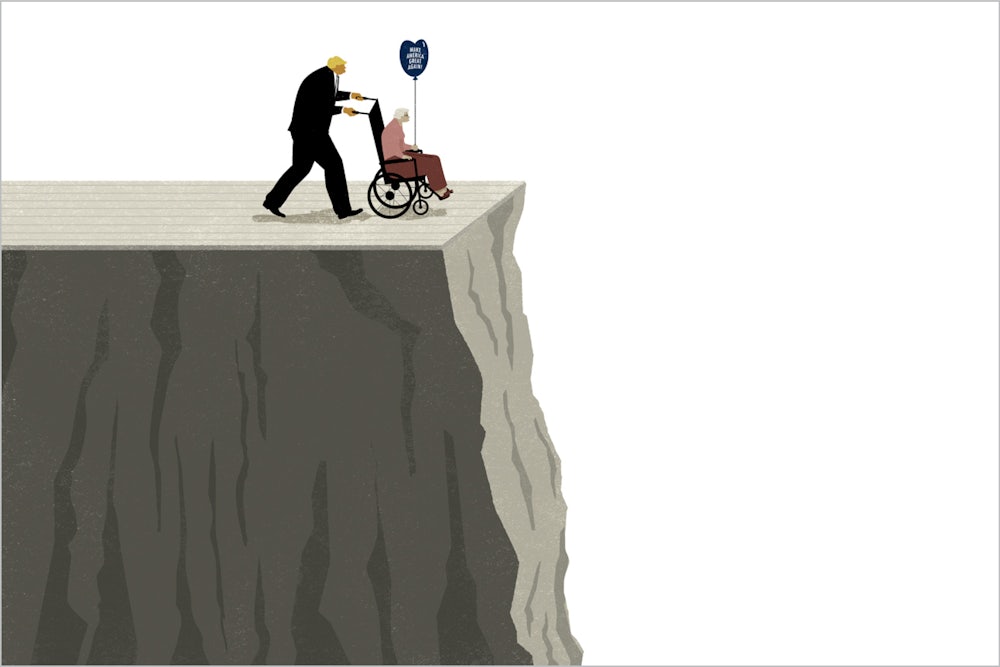When Maryann Sonnenberg voted for the man whose name is on the nursing home where she lives, she didn’t think it would wind up harming her and her fellow residents. A retired teacher’s aide from Queens, Sonnenberg lives at Trump Pavilion, a 228-bed nursing home located in the Jamaica Hospital Medical Center, the birthplace of our forty-fifth president. Sonnenberg, 88, spends her days playing bingo, singing old pop tunes, and chatting with other residents. She doesn’t pay much attention to politics, but when she does, she generally leans Democratic: She voted for Barack Obama twice. But in 2016, after following the presidential campaign on television, she decided to go with Donald Trump, who grew up in the neighborhood. “He’s from around here,” Sonnenberg says. “I figured, why not give him a chance?”
Sonnenberg, unfortunately, may soon have an answer to that question. Like nearly two-thirds of Americans living in nursing homes, she and most of her fellow residents rely heavily on funding from Medicaid, the federal health care program for the poor. Nationwide, the median cost for a private room in a nursing home is $92,000—and the overall cost for care can be four times higher than the annual income of Americans like Sonnenberg. As a result, Medicaid, along with Medicare, pays most of the bills for long-term nursing facilities, which effectively operate as taxpayer-subsidized institutions. Without federal assistance, most elderly Americans would be unable to afford long-term care—and most nursing homes would be unable to keep the doors open. MediSys, the nonprofit chain that runs Trump Pavilion, receives some $225 million a year in funding from Medicaid.
Trump ran on a promise to protect residents like Sonnenberg. “Save Medicare, Medicaid, and Social Security without cuts,” he said during the campaign. “Have to do it!” But the president’s reality has proved far different from his rhetoric. Trump’s proposed budget would cut $610 billion from Medicaid over the next decade. That’s on top of the $834 billion in cuts to Medicaid proposed in the American Health Care Act, which Trump pushed through the House in May. Under the bill, the Congressional Budget Office warns, insurance premiums for the elderly poor would soar at least eightfold, while the part of Medicare that pays for nursing care and hospices could run out of money by 2024. Both the American Medical Association and the AARP oppose the House cuts, calling them a “sweetheart deal” for special interests that would push the country “back to the time” when the elderly had far less access to care.
Medicaid funding, in fact, was at the heart of a recent scandal involving Trump Pavilion. In 2012, the facility’s CEO was sentenced to three years in prison for bribing three state lawmakers in exchange for more government aid. In addition, the facility was completely renovated in 2009 with funding from the Department of Housing and Urban Development—a federal department that is facing $6.2 billion in cuts under Trump.
Trump Pavilion isn’t named for Donald, but for his mother, Mary, a Scottish immigrant who volunteered at the center for years before her death in 2000. Mary’s husband, Fred, was a member of Jamaica Hospital’s board, one of many health care charities to which the two gave time and money. Donald has long since extended the family brand beyond the gritty boundaries of his native borough, but Sonnenberg, who has lived in Trump Pavilion since 2012, still claims the family as her own. “I think I met one of them once,” she says.
Residents at Trump Pavilion live comfortably; Sonnenberg shares a sun-filled room on the fourth floor with another woman. “The food here is great,” she says as she scoots her wheelchair through the lounge and waves to some friends gathered around a plastic card table. Known around the facility as “Miss America” for her colorful bows and headbands, Sonnenberg likes to teach the Pledge of Allegiance to fellow residents, some of whom are disabled and benefit from speech therapy as part of their long-term care. Families say they are happy with the facility. “The staff here is great,” says Sonnenberg’s granddaughter Jonna, who visits several times a week. “They really care about people here and support families.”
But if Trump succeeds at slashing federal funds for nursing homes—including the one named in honor of his own mother—Sonnenberg may come to regret her vote for the president. As Sonnenberg sees off Jonna and two of her great-grandchildren, a nurse wrapping up her shift smiles and waves goodbye to her.
“See you tomorrow, Miss America!”
Sonnenberg waves back. “You know where to find me!”
